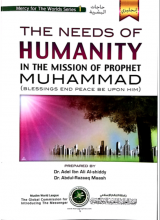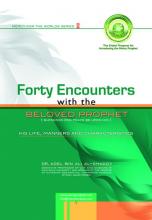The Prophet of Mercy Website
Muslim World League - Global Commission for Introducing the Messenger
by Abul hasan ‘Ali Nadwi
God had made special arrangements for broadening the mind of the Prophet (peace and blessings of Allah be upon him) and had taken particular care to shut off the faults and failures of the pagan past from him. Since his early youth, the reserved and unassuming young man was known for his gentle disposition and grave purity of life as well as for his candidness, honesty, integrity and a stern sense of duty. His was the straight and narrow path and none could find the slightest fault with him. The fair character and honorable bearing of the Apostle won for him, in the flower of his youth, the title of Al-Amin, meaning the Trusty,1 from his fellow populace.
Evil were the ways of young men in Mecca, and no misconduct brought anybody into discredit. But God helped His Apostle (peace and blessings of Allah be upon him) abandon the pleasures of life familiar to everybody in Mecca. Such that, on the contrary, he was rather kind to his kinsmen, alleviated the sufferings of others and spared or minimized expenses to meet their needs. Moreover, he entertained guests, was ever willing to join hands with anybody who had a noble and virtuous task2 and preferred to earn his livelihood by toiling hard for it even if it meant living a simple life to the point of austerity.
When the Apostle (peace and blessings of Allah be upon him) was around fourteen or fifteen years of age, the sacrilegious war, known as the Harb-ul-Fijar, broke out between the Quraysh and the tribe of Qays. The Apostle was present at these encounters and picked up the arrows that the enemy had shot, and gave them back to the Qurayshite fighters. This was his first experience with military operations.3
Now that the Apostle (peace and blessings of Allah be upon him) was coming into his years of discretion, he turned his attention to find a means of livelihood.
Like other lads of his age, he took to tending of sheep and goats. It was not deemed a disgraceful occupation in those days, rather, it helped one to be watchful, alert and quick, kind and considerate besides allowing an opportunity to inhale the freedom of Arabian air and the power of sand. More than that, it had been the convention of all the prophets of old which complied with his future prophetic office. The Prophets afterwards used to say: “Verily, there has been no prophet who has not tended the flocks of goats.” On being asked again whether he had also performed the work of a shepherd, the Prophet affirmed. “Yes I did such work.”
The Apostle (peace and blessings of Allah be upon him) was not completely new to the job for in his childhood days he used to accompany his foster-brothers who tended their flocks and herds. The reports in the Sahih show that the Apostle (peace and blessings of Allah be upon him) used to tend the goats upon the neighbouring hills and valleys for a meager payment from the owners of the flocks.4
Footnotes:
Ibn Hisham, Vol. I, p. 183
Khaidjah, the Prophet wife, referred to these qualities of her husband when she found hin perplexed after the first revelation to him.
Ibn Hisham, Vol. I, 186
The Arabic term used is Qararit about which Shibli No’mani writes n Sirat un Nabi, Vol. I, that scholars differ about the meaning of word. Suwaib b. Sa’id, the teacher of Ibn Majah, holds that Qirat (pl. Qararit) being a fraction of dirham or dinar, the Tradition means that the Prophet (peace and blessings of Allah be upon him) used to tend goats on payment and hence Bukhari included it under the chapters pertaining to wages. The finding of Ibrahim Al-Harbi, on the other hand, is that the word signifies a place near Ujhad and Ibn Jawzi prefers this meaning. ‘Oyeni has also given many reasons to support the view and the author of Nur-in-Nibras has, after a detailed discussion of the word, upheld the latter view.
******







